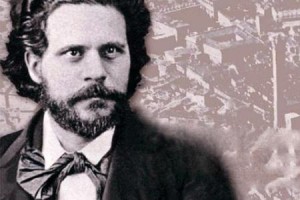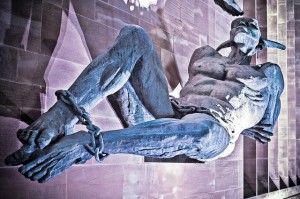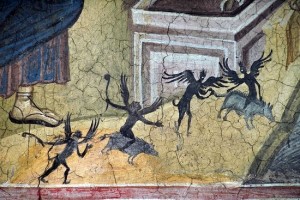Poetry in Translation (CCXXII): Giosuè Carducci, (1835-1907), ITALY, Poet, “Inno a Satana”, “Imn Satanei”, “Hymn To Satan” (fragment)
Inno a Satana
(frammento)
Giosuè Carducci
(1835-1907)
A te, dell’essere
principio immenso,
materia e spirito,
ragione e senso;
mentre ne’ calici
il vin scintilla
sì come l’anima
nella pupilla;
mentre sorridono
la terra e ’l sole
e si ricambiano
d’amor parole,
e corre un fremito
d’imene arcano
da’ monti e palpita
fecondo il piano;
a te disfrenasi
il verso ardito,
te invoco, o Satana,
re del convito.
Imn Satanei
Giosué Carducci
(1835-1907)
(Fragment)
Ţie-ţi ofer pocalul,
acestui Univers;
materie şi spirit,
cu sens şi raţiune;
Căci îţi închin,
cu cinste,
tăria reflectând
a gândului privire;
Când Soarele şi Terra
îşi schimbă-n
dulci surâsuri
cuvinte de amor,
Atunci în trup palpită
un himen de arcane
din munte spre câmpie
în solul roditor;
Iar eu îţi fac ofranda
de gânduri desfrânate
când te invoc, Satană
Domniţă a Ispitei.
(Rendered in Romanian
by Constantin ROMAN, London,
© 2013, Copyright Constantin ROMAN
Hymn To Satan
Giosuè Carducci
(1835-1907)
(fragment)
To you, creation’s
mighty principle,
matter and spirit
reason and sense
Whilst the wine
sparkles in cups
like the soul
in the eye
Whilst earth and
sun exchange
their smiles and
words of love
And shudders
from their secret embrace run down
from the mountains, and
the plain throbs with new life
To you my daring
verses are unleashed,
you I invoke, O Satan
monarch of the feast.
 SHORT BIO:
SHORT BIO:
Giosuè Carducci (1835-1907) was born near Pisa. From early age he was attracted to ancient Classic and Italian authors, in particular Dante, Tasso, and Alfieri. After several years following his graduation from the University of Pisa, he was appointed to the chair of Italian Literature at the University of Bologna, a post he held until his retirement in 1904.
His strong revolutionary tendency expressed in his “Inno a Satana” (1865) “Hymn to Satan”, reflects his free thought and of modern ideas, imagination, and revolutions.
Carducci was a translator of Goethe and Heine who influenced the development of his own poetry. He was also a noted literary historian and an eminent orator, leading an active political life. An honorary citizen of Bologna, Carducci was elected to the Senate, where he served as deputy in the House of Representatives.
Giosuè Carducci’s poetry inspired his compatriots in the war for Italian Independence, and he enjoyed an immense popularity both at home and abroad. He stands as the greatest Italian literary figure in the latter part of the nineteenth century.
Carducci’s 1906 Nobel Prize for Literature was awarded “not only in consideration of his deep learning and critical research, but above all as a tribute to the creative energy, freshness of style, and lyrical force which characterize his poetic masterpieces”.





No Comments so far ↓
Like gas stations in rural Texas after 10 pm, comments are closed.